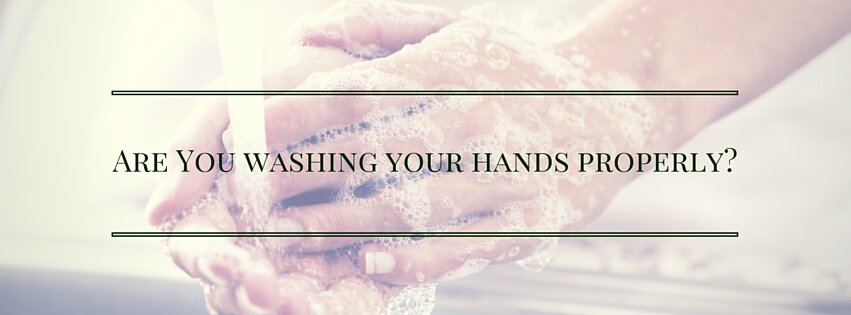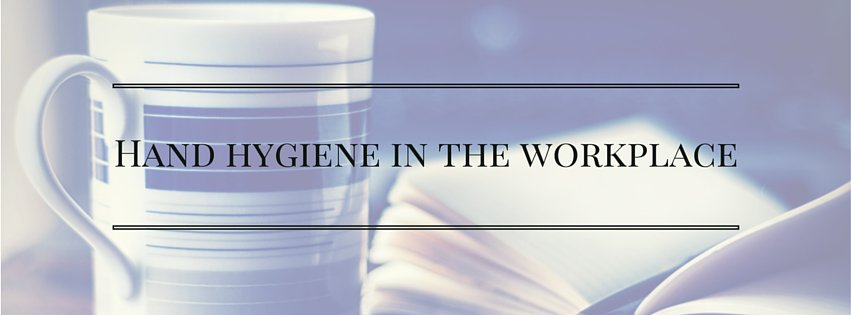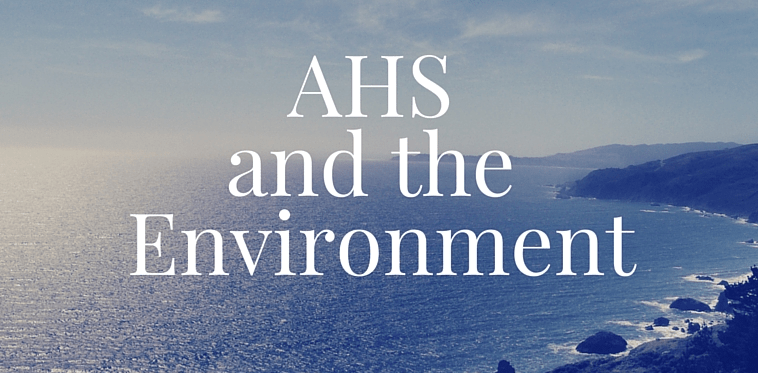
by LBrownless@absolutehygienesolutions.com | May 6, 2016 | Hand Hygiene
There seems to be so much information out there that you may find yourself wondering how you wash your hands properly. Glasgow Caledonian University researched into hand washing techniques in the healthcare industry and found that the six step method recommended by World Health Organisation is more superior to the standard method of rubbing your hands together for 20 seconds or so, followed by a rinse. Glasgow Caledonian University found this six step method was micro-biologically more effective for reducing the bacterial count (from 3.28 to 2.58) compared to the standard method. Healthcare professionals have to be more vigilant when washing their hands but we’ve made our own fun AHS poster that will help to promote excellent hand hygiene, no matter where you work. One way to think about it is you should wash your hands thoroughly for as long as it takes to sing Happy Birthday twice. Wet hands and apply soap or hand sanitiser. Rub palms together until soap is bubbly Rub each palm over the back of the other hand Then rub between your fingers on each hand Rub the backs of your fingers against the opposite palm while interlocking your fingers Clasp your left thumb in your right palm and rub in a rotational motion, then switch hands and carry out the same step. Carry out rotational rubbing backwards and forwards while clasping the fingers of your right hand in the palm of your left and vice versa Click here to view our Clean Crew...

by LBrownless@absolutehygienesolutions.com | May 5, 2016 | Hand Hygiene
Here at AHS we work closely with the Healthcare industry from care homes to private and NHS hospitals and that is why we are supporting the World Health Organisation’s campaign, SAVE LIVES: Clean Your Hands. Washing your hands is the simplest way to prevent and control infections, which is incredibly important in the healthcare industry. However it is the lack of compliance among healthcare providers which causes problems worldwide. Just recently, shocking statistics were released that revealed a large majority of healthcare workers in outpatient care, did not wash their hands efficiently and in some cases, not at all. This campaign is working to improve hand hygiene globally, in surgical wards to operating theatres to outpatient surgical services to reduce HCAI (Health Care Associated Illness) and the burden on health systems. Hospital patients are more at risk of developing infections, especially if they have scars or wounds. Each time a healthcare worker touches a patient, microorganisms are transferred. These little micro-organisms have strong standing power as they can survive on hands for anything between 2 minutes to an hour. In the absence of hand hygiene action there is a greater degree of hand contamination. The possible implications of not washing your hands are huge – infections lead to more serious illnesses, prolonged hospital stays, financial costs and in the worst case, tragic loss. The good news is most health-care associated infections are preventable through hand hygiene – cleaning hands at the right time and in the right way. You can visit World Health Organisation’s website to find out lots more about hand hygiene and we have a few articles...

by LBrownless@absolutehygienesolutions.com | May 4, 2016 | Hand Hygiene
We all know you should be washing your hands but are you aware of just how good it is at infection control? It’s so important, wherever you are, that you make sure you wash your hands after every toilet visit, before and after preparing food, after a cough or sneeze and when dealing with patients. Why should you wash your hands? First of all, it is the easiest way to prevent sickness in the workplace. A typical worker in an office comes in to contact with 10 MILLION germs A DAY. Toilets, and in particular, faeces, are a big source of germs, such as Salmonella and Norovirus which can give you diarrhoea. In fact you’re 31% more likely to get diarrhoea if you do not wash your hands. A single gram of human faeces—which is about the weight of a paper clip—can contain one trillion germs. These germs can get onto people’s hands and if they are not washed off can be passed from person to person and could make you sick. Bacteria can spread very quickly- in just 8 hours one bacterium could have multiplied by 17 million. Handwashing properly reduces the amount of bacteria on your hands and the chances of it spreading further. But, did you know that 1 in 10 people do not wash their hands? Say you work in an office of ten people: you probably think one person isn’t that bad. But imagine this, that one person could be the colleague opposite you who has just gone to toilet. On his or her way back to the desk, he/she has offered to do...

by LBrownless@absolutehygienesolutions.com | Apr 22, 2016 | Environmentally Friendly
Today is World Oceans Day and now more than ever we need to look after our environment. It’s held every year to honour, help protect, and conserve the world’s oceans. A healthy world ocean is critical to our survival: They generate most of the oxygen we breathe They help feed us They regulate our climate They clean the water we drink They offer a pharmacopoeia of medicines They provide limitless inspiration! What will you be doing as part of the #WaveForChange? We’re going to reduce our usage of plastic disposable bags and make sure we always pack a reusable bag with us. Being environmentally friendly is important in business too that’s why we only offer products and services that will have a positive impact on the environment and your sustainability targets. AHS and the Environment Firstly, it starts with us. We’re ISO 14001 accredited so we are committed to being environmentally conscious. From choosing our product design, packaging and products to servicing we always consider the environment. In fact, all of our products can be recycled. Reduce Your Water Usage Whether you’re a small business or a big company you could be using more water than necessary. Typically, one urinal, without water management uses 315,000 litres of fresh, drinking water per year. What does 315,000 litres of water look like? –3939 bath tubs –10 petrol tankers –15,750 water cooler bottles –4848 washing machine cycles –9004 showers And that is just one urinal – you probably have more! With an AHS Water Management System it reduces the flushing time to once per hour and even stops completely when the building is unoccupied, meaning your urinal will flush...





